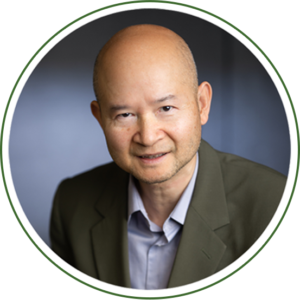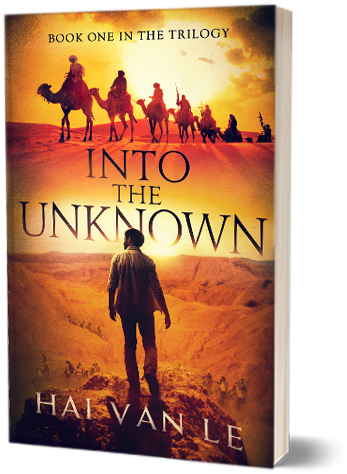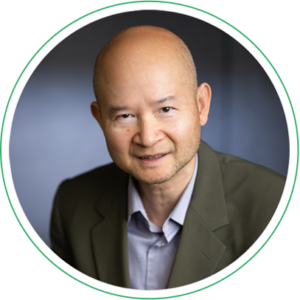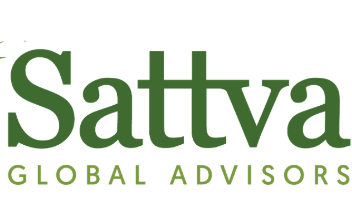


“…a gripping tale of resilience, courage, and determination that fans of adventure and thriller novels are sure to adore…”

Author of Into the Unknown, an international thriller about a geologist held hostage by Islamic fundamentalists in Mali, Hai is also the founder and Managing Director of Sattva Global Advisors, an international financial advisory firm specializing in project acquisition, strategic partnership and project finance in the mining industry. Since inception, Hai and his team have arranged and advised on nearly a quarter of billion dollars in transactions, including close to $100 million in debt and equity financing for the firm’s clients.
Prior to Sattva Global Advisors, Hai worked in various corporate development positions for a number of junior resource companies active in Latin America, including a gold producer with assets in Peru. He possesses a strong command of Spanish. His personal and professional travel has taken him to most Latin American countries, including Paraguay, the hermit republic, in the heart of South America.
Hai has a degree in political science from Simon Fraser University, supplemented by years of additional studies in accounting and technical/financial analysis. In his spare time, he is working on Gold Rush, the sequel to Into the Unknown.

Fall 2024

TBA

TBA

“…a gripping tale of resilience, courage, and determination that fans of adventure and thriller novels are sure to adore…”

Some people are natural-born entrepreneurs. They start their great businesses while in university. Michael Dell, Bill Gates and Mark Zuckerberg come to mind. Others work for their family-owned businesses and later take over. Some discover a niche later on in their life. I’m one of those and Sattva Global Advisors is the result.
In the fall of 2005, I was working as Director of Corporate Development for a producer with a gold mine in Peru. The job entailed preparing financial projections, drafting press releases and putting management in front of institutional investors, among other duties.
By that time, I had amassed a great deal of skills and knowledge about the junior mining industry.
I had worked for other junior exploration and development companies active in Latin America before. And before that, I was editor of Inside Track, an independent investment publication focused on the mining industry.
In these roles, I saw firsthand how deals were structured, capital was raised and projects promoted. In my spare time, I had studied them in detail by cross-referencing various disclosure documents. I read the fine print, so to speak.
I could analyze financial statements as well as any analyst, having taken advanced financial accounting & finance courses and completed the Canadian Securities Course.
I know what institutional sales people and investment bankers in a brokerage firm do. I know who some of their investors are and where they can be found.
Inertia being what it is, I would have been content to stay in that position for years to come had there not been a quirk of fate. Months earlier when it came time for salary negotiation, I had greatly angered my boss by making a high demand believing that in negotiation, it’s better to start high and then go lower, a technique known as anchoring.
The attempt backfired badly.
My boss kind of stopped talking to me. In hindsight, I know he was irritated with me. At the time, there was also a shareholder who had my boss’ ear. He had a daughter who needed a job. By the end of the year, I was out, replaced by his daughter.
As the saying goes, when one door closes, another one opens. Little did I know at the time that this was the catalyst for my new entrepreneurial career, a nudge to expand my horizons, the beginning of an amazing personal growth experience.
I had a young family then, with two boys. I was close to finishing my second undergraduate degree (in accounting) at night at the time.
What to do next? Look for a new job? Start my own business? I did all of these.
The timing to transition into something new was perfect in hindsight. For one thing, the industry was nearing a peak, driven by the much-hyped Commodity Supercycle fueled by supposedly never-ending double-digit Chinese economic growth.
There was lots of money floating around to finance the next promising project.
Timing is everything. There were certain important relationships that needed to be forged, lessons to learn and deals to be brokered. If I was still tied to my old employer, I would have missed all of these opportunities.
As I attended industry events and conferences, in the process of listening to and talking to people, I became a familiar face to some people. They trusted me enough to share with me important information about their needs – and the private projects they were working on.
Knowledge is power. Being in the middle and knowing the various needs of different players, I was in a position to meet their needs by bringing them together.
Within six years from that seminal date, together with my associates, we had arranged transactions in the gold, molybdenum and uranium space valued at about $140 million. Some of these projects were world-class in nature.
Notable among them was Lucky Jack (a world-class molybdenum project which enabled our client to raise $28.5 million); El Creston (another world-class molybdenum project acquired for U.S $30 million by our client who subsequently sold it for $195 million within a few years); a $10 million financing for the Santo Domingo iron/copper project in Chile at a critical time just before the implosion of Lehman Brothers triggered the Great Financial Crisis; uranium and gold projects in Paraguay, Mexico and Canada.
To increase our firm’s profile, we set up a booth at PDAC, the world’s biggest mining conference. There, for nine consecutive years, I interacted with a wide range of players in the industry, getting exposed to new ideas, projects, and people from all over the world. I have seen brilliant successes and equally spectacular failures; people who go from zero to hero overnight and vice versa.
During the lean years in the industry, which came about after the Great Financial Crisis of 2008 and as gold languished in a range between $1200 – $1370 for years, I focused on learning the art and psychology of (swing) trading. By then, I knew it’s an illusion that fundamental analysis alone is enough to help one succeed in the stock market.
I devoured books on technical analysis, the psychology of mastering the trade and biographies of great traders. I put that new knowledge into practice.
At one point, our firm had a modest-sized in-house trading division. (And to this day we still have a full-time competent trader to look after the firm’s capital.)
Now I could say I’m a conscious trader/investor with my own distinctive approach and philosophy refined from years in the trenches. Neither greed mor fear sways me anymore. The satisfaction of putting on a great trade and being right matters more than profits.
For every confirmed success, there were many on the verge of closing, but for one reason or another, they didn’t close. In one M&A deal worth between $60 – $70 million, our client got as far as the second term sheets from a state-owned company. Unfortunately, the deal didn’t close.
If there’s anything I learn from this experience, it is this: keep mum until the deal is closed. I don’t need to tip anyone off to it, even those closest to me. I don’t care to impress anyone. It sounds like I’m superstitious, but there’s a lot of truth in the old wisdom that one should keep the energy focused on the deal until completion and not talk about it so as not to dissipate the energy.
In another transaction, I was deeply involved in negotiation on behalf of a client with a private equity firm for a modest-sized transaction ($40 million). We got as far as the fifth term sheet. An agreed-to term sheet is no guarantee of success. The deal still needs to survive the due diligence process which can be extensive. In the meantime, lots of things can happen.
Being so close to success and yet walking away empty handed is very hard. Dispiriting, to say the least.
I don’t know where I heard or read this, but I never forgot it. It goes something like this: It’s not how many times you get knocked down that count, it’s how many times you get back up.
To this day, whenever I’m confronted with a failure or any setback, I think back to that seminal event before my entrepreneurial career and remember that, as difficult as predicting the future, things are working out for my highest good somehow.
Along the way, many doors have been opened to me at opportune moments. And now it’s my turn to open doors to others so we all can grow, learn and leave a positive legacy on our short journey here on earth.
There’s power in a group of like-minded people working together towards a common purpose, leveraging off the unique skillset of each. There’s grace in going with the flow and realizing we’re all connected somehow and helping one another on an endless journey of discovery and growth.


Vancouver, Canada
Author of
Set in 2011 Mali, Into the Unknown is Hai’s debut novel is about a geologist held for ransom by Islamic fundamentalists.
His voyage to hell…and back sets in motion a complex chain of events which not only jeopardizes his employer’s project, sparks Africa’s biggest ever artisanal miner invasion, but also rocks the country’s political foundation to its core.
As a global dealmaker, Hai has successfully built long-term relationships that span all continents, bringing with him a network of top industry contacts in many global financial centres. He brings two decades of experience in negotiations, deal-structuring, capital raising, and asset acquisition in the natural resources sector to Sattva Global Advisors.
Since inception, the firm has arranged approximately $230 million in transactions, including two world-class molybdenum projects, and $95 million in debt and equity financings for development-stage projects in Canada and Chile.
Prior to his involvement in Sattva Global Advisors, Hai worked in various corporate development positions for a number of junior resource companies, including a gold producer with assets in Peru. He’s been to most Latin American countries, including Paraguay, the hermit republic in the heart of South America. Hai has a good command of Spanish and holds a Bachelor of Arts in Political Science from Simon Fraser University. He writes geopolitical thrillers with a spiritual undertone in his spare time.
Some people are natural-born entrepreneurs. They start their great businesses while in university. Michael Dell, Bill Gates and Mark Zuckerberg come to mind. Others work for their family-owned businesses and later take over. Some discover a niche later on in their life. I’m one of those and Sattva Global Advisors is the result.
In the fall of 2005, I was working as Director of Corporate Development for a producer with a gold mine in Peru. The job entailed preparing financial projections, drafting press releases and putting management in front of institutional investors, among other duties.
By that time, I had amassed a great deal of skills and knowledge about the junior mining industry.
I had worked for other junior exploration and development companies active in Latin America before. And before that, I was editor of Inside Track, an independent investment publication focused on the mining industry.
In these roles, I saw firsthand how deals were structured, capital was raised and projects promoted. In my spare time, I had studied them in detail by cross-referencing various disclosure documents. I read the fine print, so to speak.
I could analyze financial statements as well as any analyst, having taken advanced financial accounting & finance courses and completed the Canadian Securities Course.
I know what institutional sales people and investment bankers in a brokerage firm do. I know who some of their investors are and where they can be found.
Inertia being what it is, I would have been content to stay in that position for years to come had there not been a quirk of fate. Months earlier when it came time for salary negotiation, I had greatly angered my boss by making a high demand believing that in negotiation, it’s better to start high and then go lower, a technique known as anchoring.
The attempt backfired badly.
My boss kind of stopped talking to me. In hindsight, I know he was irritated with me. At the time, there was also a shareholder who had my boss’ ear. He had a daughter who needed a job. By the end of the year, I was out, replaced by his daughter.
As the saying goes, when one door closes, another one opens. Little did I know at the time that this was the catalyst for my new entrepreneurial career, a nudge to expand my horizons, the beginning of an amazing personal growth experience.
I had a young family then, with two boys. I was close to finishing my second undergraduate degree (in accounting) at night at the time.
What to do next? Look for a new job? Start my own business? I did all of these.
The timing to transition into something new was perfect in hindsight. For one thing, the industry was nearing a peak, driven by the much-hyped Commodity Supercycle fueled by supposedly never-ending double-digit Chinese economic growth.
There was lots of money floating around to finance the next promising project.
Timing is everything. There were certain important relationships that needed to be forged, lessons to learn and deals to be brokered. If I was still tied to my old employer, I would have missed all of these opportunities.
As I attended industry events and conferences, in the process of listening to and talking to people, I became a familiar face to some people. They trusted me enough to share with me important information about their needs – and the private projects they were working on.
Knowledge is power. Being in the middle and knowing the various needs of different players, I was in a position to meet their needs by bringing them together.
Within six years from that seminal date, together with my associates, we had arranged transactions in the gold, molybdenum and uranium space valued at about $140 million. Some of these projects were world-class in nature.
Notable among them was Lucky Jack (a world-class molybdenum project which enabled our client to raise $28.5 million); El Creston (another world-class molybdenum project acquired for U.S $30 million by our client who subsequently sold it for $195 million within a few years); a $10 million financing for the Santo Domingo iron/copper project in Chile at a critical time just before the implosion of Lehman Brothers triggered the Great Financial Crisis; uranium and gold projects in Paraguay, Mexico and Canada.
To increase our firm’s profile, we set up a booth at PDAC, the world’s biggest mining conference. There, for nine consecutive years, I interacted with a wide range of players in the industry, getting exposed to new ideas, projects, and people from all over the world. I have seen brilliant successes and equally spectacular failures; people who go from zero to hero overnight and vice versa.
During the lean years in the industry, which came about after the Great Financial Crisis of 2008 and as gold languished in a range between $1200 – $1370 for years, I focused on learning the art and psychology of (swing) trading. By then, I knew it’s an illusion that fundamental analysis alone is enough to help one succeed in the stock market.
I devoured books on technical analysis, the psychology of mastering the trade and biographies of great traders. I put that new knowledge into practice.
At one point, our firm had a modest-sized in-house trading division. (And to this day we still have a full-time competent trader to look after the firm’s capital.)
Now I could say I’m a conscious trader/investor with my own distinctive approach and philosophy refined from years in the trenches. Neither greed mor fear sways me anymore. The satisfaction of putting on a great trade and being right matters more than profits.
For every confirmed success, there were many on the verge of closing, but for one reason or another, they didn’t close. In one M&A deal worth between $60 – $70 million, our client got as far as the second term sheets from a state-owned company. Unfortunately, the deal didn’t close.
If there’s anything I learn from this experience, it is this: keep mum until the deal is closed. I don’t need to tip anyone off to it, even those closest to me. I don’t care to impress anyone. It sounds like I’m superstitious, but there’s a lot of truth in the old wisdom that one should keep the energy focused on the deal until completion and not talk about it so as not to dissipate the energy.
In another transaction, I was deeply involved in negotiation on behalf of a client with a private equity firm for a modest-sized transaction ($40 million). We got as far as the fifth term sheet. An agreed-to term sheet is no guarantee of success. The deal still needs to survive the due diligence process which can be extensive. In the meantime, lots of things can happen.
Being so close to success and yet walking away empty handed is very hard. Dispiriting, to say the least.
I don’t know where I heard or read this, but I never forgot it. It goes something like this: It’s not how many times you get knocked down that count, it’s how many times you get back up.
To this day, whenever I’m confronted with a failure or any setback, I think back to that seminal event before my entrepreneurial career and remember that, as difficult as predicting the future, things are working out for my highest good somehow.
Along the way, many doors have been opened to me at opportune moments. And now it’s my turn to open doors to others so we all can grow, learn and leave a positive legacy on our short journey here on earth.
There’s power in a group of like-minded people working together towards a common purpose, leveraging off the unique skillset of each. There’s grace in going with the flow and realizing we’re all connected somehow and helping one another on an endless journey of discovery and growth.

Sattva Global Advisors Inc. is an international financial advisory firm focused on cross-border M&A, strategic partnerships,
and corporate finance in the mining industry. We leverage global connections, game-changing ideas, and deep industry
knowledge to help clients achieve transformational growth.
© 2021 Sattva Global Advisors Inc. Suite 908, 938 Howe Street, Vancouver, BC, V6Z 1N9